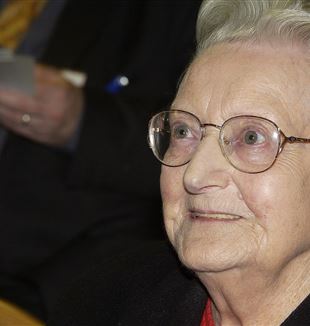
You matter
An exhibition on Cicely Saunders, the founder of palliative care, was proposed for this year's Oxford Convergence: "Cicely is more alive than ever, and she has given each of us something different over the past months."A few months ago, when some of us discussed the idea of bringing the Cicely Saunders exhibition out of a stock room in London and giving it life again, we could not have imagined the final result at all.
The second edition of the Oxford Convergence: True companionship, Solitude and Belonging gave us the opportunity to share the life of this English woman, born at the beginning of the 20th Century, and the founder of palliative care.
One of us has previously spoken with a friend about end-of-life issues and euthanasia, who came to Oxford to see the exhibition, despite being in support of assisted dying. His openness surprised us. After the tour, he was deeply touched by Cicely’s life, her definition of total pain and her research on chronic pain management. He said, “I did not know any of this”. That simple comment made us realise that today, many people support assisted suicide because “they simply do not know”. The end of life is such an unknown and frightening moment that many are afraid to face it. Especially in today’s society, where so many people are alone, people may prefer to have the choice – even if never acted upon – to end their lives in an extreme situation of pain. We fear suffering, but we are even more afraid of suffering on our own, as Cicely said: “the face of a patient changes when they are reassured that they will not die alone”. Cicely’s legacy is a powerful weapon to face the debate of assisted suicide. It is not about the right to live or to die, it is about getting to know that it is possible for a terminally ill patient to live their last days peacefully. With the right pain control, those last days can be the most meaningful for the person leaving this world and for the relatives and friends whom they leave behind, helping them to resume their journey.
Cicely’s objections to euthanasia were not because of her religious convictions or the defence of the sanctity of life, but because of her knowledge of what medicine could do. In 1969, when the bill to legalise euthanasia was put before the House of Lords, she wrote a long letter to The Times saying: “(…) there are few forms of physical distress which cannot be dealt with by good medical and nursing care, that the emotional and spiritual distress of incurable disease requires human understanding and compassion and a readiness to listen rather than a lethal drug.”
Cicely embraced every human being, regardless of their culture, religion, race and she welcomed everyone until the very end. She looked at each person in their entirety: in their family context, their networks of relationships, and their individual capacity to face physical deterioration. Decisions about the right dose of pain relief also took all these factors into account. She even said that a person surrounded by love may need less medication than a person who is alone.
In one of her final speeches, she said: “We may be small specks of dust in the immensity of the galaxies, but […] the Hospice’s welcome to each person, patient, family, staff or volunteer, is simply: You matter because you are you, and you matter to the last moment of your life. We will do all we can not only to help you die peacefully, but also to live until you die.”
She said that “even when we feel that we can do absolutely nothing, we still have to be prepared to stay” ‘watch with me’” means, above all, just ‘be there’”. She firmly believed that even though some situations cannot be changed, they can be transformed.
We are happy with what we have achieved and grateful for opportunity to share Cicely’s life and legacy during the Oxford Convergence weekend as an example of True Companionship. During one of the panels, someone remarked that there are two kinds of death: the first is biological, and the second is when no one remembers you. We all agree that Cicely is more alive than ever, and she has given each of us something different over the past months.
Blanca, London